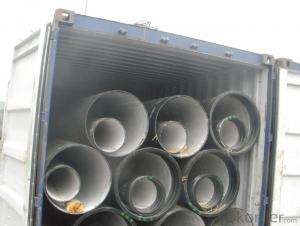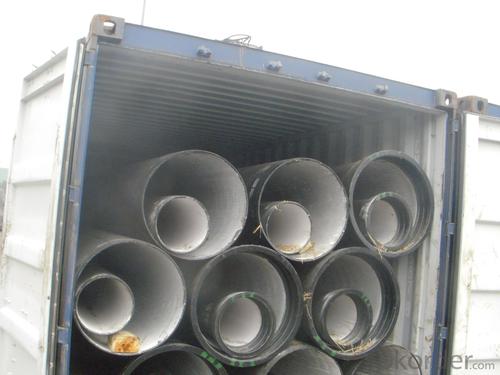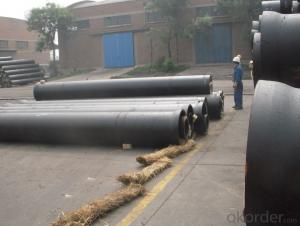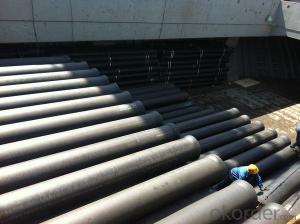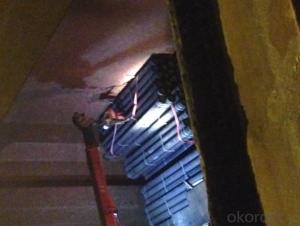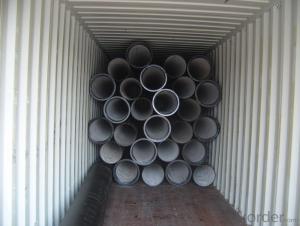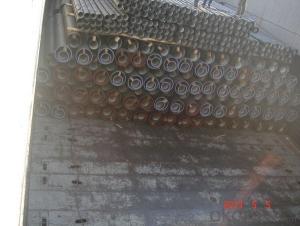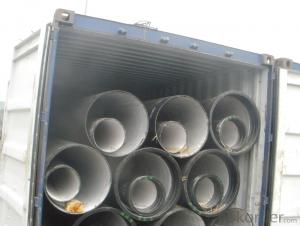DUCTILE IRON PIPES AND PIPE FITTINGS C CLASS DN1100
- Loading Port:
- Tianjin
- Payment Terms:
- TT OR LC
- Min Order Qty:
- 22 m.t
- Supply Capability:
- 30000 m.t/month
OKorder Service Pledge
OKorder Financial Service
You Might Also Like
Material : Ductile Cast Iron
Size Range : DN 80mm to DN 2000mm
Unit Effective Length : 6m or 5.7m
Manufacture Standard: ISO 2531:1998/ EN 545:2006/EN 598:2007
Annual capacity : 200,000 tons
Coating Exterior: Zinc 130g/m2 according to ISO 8179-1 and bitumen coating 70 microns.
Cement Interior: Portland Cement/ High Alumina Cement/ Sulphate Resisting Cement Lining according to ISO 4179
Special requirements on external coating and internal lining can be applied
We also provide accessories such as SBR/EPDM rubber gaskets, lubricant paste, pipe caps, PE sleeves, etc.
Additional Parts:
Each pipe is strictly inspected according to related standard to ensure permanently high performance.
Easy Installation at site and service free for life
Long Service Lifespan
Quotation will arrive you within 24hours once we get your inquiry.
We guarantee offering you a competitive price.
A copy of original inspection reports of pipes will be offered after shipment.
Photos of loading process will be sent to the customer after shipment effect.
We will follow-up the delivery progress after shipment effect and update to the customer on weekly basis.
- Q: Can ductile iron pipes be used for trenchless pipe rehabilitation methods?
- Yes, ductile iron pipes can be used for trenchless pipe rehabilitation methods. Trenchless methods such as cured-in-place pipe lining or pipe bursting can effectively repair and rehabilitate ductile iron pipes without the need for extensive excavation. These methods provide a cost-effective and efficient solution for rehabilitating aging or damaged ductile iron pipes while minimizing disruption to the surrounding environment.
- Q: Can ductile iron pipes be used in areas with high levels of organic matter in soil?
- Ductile iron pipes are capable of being utilized in regions where soil contains significant amounts of organic matter. These pipes are renowned for their robustness and potency, rendering them appropriate for diverse soil circumstances, including those with elevated organic matter levels. They possess resistance against corrosion and can endure the chemical reactions that transpire in soils abundant in organic material. Furthermore, ductile iron pipes possess a sleek inner surface, diminishing the probability of accumulation and obstruction caused by organic matter. Nonetheless, it is crucial to contemplate the precise soil conditions and seek advice from engineers or specialists to guarantee adherence to correct installation and upkeep procedures.
- Q: Are ductile iron pipes resistant to microbiologically induced corrosion?
- Generally, ductile iron pipes exhibit resistance to microbiologically induced corrosion (MIC). Ductile iron, a variant of cast iron, undergoes treatment involving the addition of magnesium to enhance its strength and flexibility. Consequently, this process forms a protective layer on the iron's surface, rendering it less prone to corrosion initiated by microorganisms. MIC arises when specific bacteria, fungi, or other microorganisms interact with the metal surface of pipes, producing corrosive byproducts. Nevertheless, ductile iron generally resists MIC due to the presence of the protective layer, which acts as a barrier, thus preventing direct contact between microorganisms and the metal surface. Furthermore, ductile iron pipes are often coated with cement mortar or other protective coatings, further bolstering their corrosion resistance. These linings supply an additional layer of defense against microorganisms, reducing the likelihood of MIC. Nevertheless, it is crucial to note that the extent of resistance to MIC can vary depending on the specific conditions and environment in which the pipes are installed. Factors such as water quality, temperature, and the presence of certain microorganisms can influence the susceptibility of ductile iron pipes to MIC. Consequently, it is imperative to consider these factors and implement appropriate measures to prevent MIC. This may include regularly monitoring water quality, maintaining the pipes properly, and employing corrosion inhibitors or biocides when necessary.
- Q: Can ductile iron pipe be used for fire protection systems?
- Yes, ductile iron pipe can be used for fire protection systems. Ductile iron pipe is known for its strength and durability, making it suitable for various applications, including fire protection systems. Its high tensile strength and resistance to cracking and breaking make it a reliable choice for transporting water and other fire suppression agents. Additionally, ductile iron pipe has excellent corrosion resistance properties, ensuring long-term performance and reliability in fire protection systems. Overall, ductile iron pipe is a suitable and commonly used material for fire protection systems due to its strength, durability, and corrosion resistance.
- Q: DN300 what's the price of the ductile iron pipe / the weight and the price of one meter?
- The annealed ductile iron pipe is composed of ferrite and pearlite. The mechanical properties of the ductile iron pipe are better.
- Q: How many meters does the cast iron water supply pipe dn150,1 tons?
- When pouring added calcium alloy in the flow inlet for graft inoculation, every time after the pouring, need in the mold surface with compressed air spraying a thin layer of dry calcium silicate powder, a centrifuge is composed of upper and lower halves of the closed shell, the supporting cast roller is installed on the bottom of the shell, the mold in front of a ring gear mounted on the housing at the end of the DC motor through the transmission gear direct mold, shell mold through Hugh ends are equipped with sealing ring, the front end of the shell shell installed with half ring a turning cylinder pictophonetic mountain Rae centrifuge under the wheels, so as to make reciprocating motion on the inclined orbit
- Q: Are there any specific standards or regulations for ductile iron pipe?
- Ductile iron pipe is subject to specific standards and regulations. It is widely used in water and wastewater systems due to its strength and durability. The American Water Works Association (AWWA) C151 standard is the most well-known standard for ductile iron pipe. This standard outlines the minimum requirements for ductile iron pipe, including materials, dimensions, tolerances, and testing methods. It also provides guidance on the manufacturing, installation, and maintenance of ductile iron pipe systems. Apart from the AWWA C151 standard, there are other standards and regulations that govern the use of ductile iron pipe in different countries. In Europe, for instance, ductile iron pipe is regulated by the EN 545 and EN 598 standards. These standards specify the requirements for ductile iron pipes and fittings used in water supply and wastewater systems. Additionally, government agencies like the Environmental Protection Agency (EPA) in the United States may have specific regulations and guidelines for using ductile iron pipe in certain applications, such as drinking water systems. Manufacturers, contractors, and engineers involved in the design, installation, and maintenance of ductile iron pipe systems must ensure compliance with these standards and regulations. This is crucial to guarantee that ductile iron pipe is manufactured to the highest quality standards and that it is installed and maintained correctly, ensuring its durability and reliability in water and wastewater systems.
- Q: How are ductile iron pipes different from cast iron pipes?
- Ductile iron pipes are different from cast iron pipes in terms of their composition and properties. Ductile iron pipes are made from a type of cast iron that has been treated with magnesium to improve its strength and flexibility. This makes ductile iron pipes more durable, impact-resistant, and less prone to cracking or breaking compared to traditional cast iron pipes. Additionally, ductile iron pipes have a higher tensile strength, allowing them to withstand higher internal and external pressures. In summary, ductile iron pipes are a more modern and advanced version of cast iron pipes, offering improved performance and longevity.
- Q: Are ductile iron pipes resistant to freeze-thaw cycles?
- Yes, ductile iron pipes are resistant to freeze-thaw cycles. Ductile iron is a type of cast iron that has been treated with magnesium, which improves its strength, durability, and resistance to cracking. This enhanced material properties make ductile iron pipes highly resistant to the expansion and contraction that occurs during freeze-thaw cycles. Unlike other materials such as PVC or concrete, which may crack or break under the pressure caused by freezing water, ductile iron pipes have the ability to withstand these cycles without sustaining any significant damage. Additionally, ductile iron pipes have a smooth interior surface that prevents the formation of ice or frost buildup, further enhancing their resistance to freeze-thaw cycles. Overall, ductile iron pipes are an excellent choice for water distribution systems in regions with cold climates, as they offer superior resistance to the effects of freezing and thawing.
- Q: Do ductile iron pipes have inner enamel?
- If the market supply is indeed difficult, can be done by the owners, Design Institute of supplier relationship; if the design institute requires it to provide products can persist in wilfully and arbitrarily, the available information (if the market can not supply, design a hair ah).
Send your message to us
DUCTILE IRON PIPES AND PIPE FITTINGS C CLASS DN1100
- Loading Port:
- Tianjin
- Payment Terms:
- TT OR LC
- Min Order Qty:
- 22 m.t
- Supply Capability:
- 30000 m.t/month
OKorder Service Pledge
OKorder Financial Service
Similar products
Hot products
Hot Searches
Related keywords
